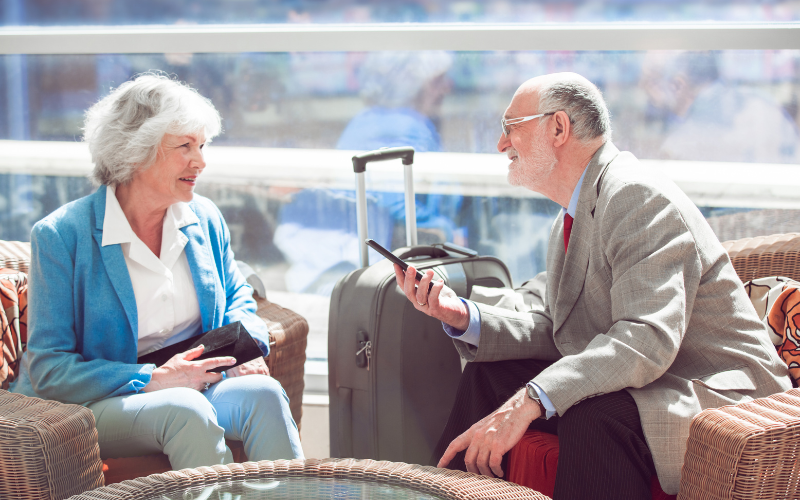When seniors go to bed for the night, this does not always mean they will get a peaceful night’s rest. Some elderly individuals may have difficulty sleeping through the night for a number of reasons, including chronic pain or illness, sleep disorders, or the effects of medications. Seniors who make frequent bathroom trips during the night may have difficulty seeing in the dark and those with dementia may wake up in a state of confusion and begin wandering through the home.
For seniors who wake up frequently, it can be risky and even dangerous for them to be left alone at night as they might hurt themselves or manage to leave their home. However, it is also difficult for families to be able to provide attentive care for their senior loved ones through the night. If you have senior loved ones who wake up often at night, you should consider working with an overnight caregiver. Overnight caregivers stay awake overnight in the home with your loved ones to provide support for when they awaken at night.
In this guide, we will cover the main duties of an overnight caregiver to help you determine if your elderly loved ones could benefit from overnight care.
What is an overnight caregiver?

An overnight caregiver arrives at the senior’s home shortly before bedtime and remains awake and alert in the home until morning. The first thing these caregivers do is help the senior with their nighttime routine and ensure they get safely to bed. During the night, the overnight caregiver provides quality care and assistance as needed and monitors the senior to ensure he is safe and comfortable. In the morning, they can help the senior get out of bed and ready for the day.
Why would a senior need overnight care?
The reasons for beginning overnight care are many. A senior may have recently been discharged from the hospital and require constant supervision, even throughout the night. Or the elderly individual may be on bedrest due to an illness or chronic condition, necessitating overnight care. A senior who needs temporary support, especially during the night, also benefits from overnight care. Another instance where overnight care is needed is when the aging person is wheelchair bound. When a person requires support to move around the home at night, overnight care is helpful. Overnight care is extremely beneficial for seniors who show signs of dementia or Alzheimer’s disease. Sleep that is disrupted is likely to aggravate dementia conditions. As a result, the dementia patient will experience disorientation and anxiety. An overnight caregiver is trained to calm the senior.
Sleep patterns change as people age. Seniors also have a harder time falling asleep. Once they are asleep, seniors wake up often at night (on average three to four times) and are aware that they are awake. Because seniors wake up at night, they spend less time in deep sleep. Seniors wake up several times a night due to various reasons. They may need to get up to use the restroom, or discomfort or pain from chronic ailments can keep them up at night. Seniors may be ridden with insomnia, anxiety, or depression, which also contribute to sleeplessness.
It is normal for seniors to wake up once or twice per night. Waking up more often should prompt the services of an overnight caregiver. Family members should observe their elderly loved one’s nighttime activity to determine whether an overnight caregiver is needed to tend to the senior.
1. Dementia Care
An overnight caregiver provides a range of compassionate care services when the senior wakes at night. Dementia or Alzheimer’s patients may wander aimlessly at night, which is a symptom of the disease. Overnight caregivers will gently guide the senior back to the safety of his room.
Dementia patients who wander at night are vulnerable to falls and fall-related injuries. Overnight caregivers are alert at night and will ensure the senior who wanders does not trip or fall in the darkness. The caregiver also protects the senior from wandering out of the house and getting lost. The overnight caregiver supervising a dementia patient will be sure to keep the house doors securely locked to deter wandering. Access to keys will be revoked as a means to discourage wandering. The caregiver may even place large, no-exit signs on the door to prevent the senior from opening doors (Click here to learn more: Dementia Care).
2. Restroom Assistance
It is common for seniors to use the bathroom urgently at night. Especially for older individuals with mobility issues, overnight caregivers are essential. The overnight caregiver is ready to provide physical support to ensure the senior gets to the toilet in time and safely in the darkness of night.
3. Sleep Promotion
Overnight caregivers are aware of measures to promote sleep in the elderly. These professionals avoid giving seniors stimulants, like coffee, soda, or tea, before bed. Caregivers also engage in relaxation techniques to encourage sleep and avoid excessive stimulation, like violent TV shows, prior to bedtime.
A senior might fall asleep with a light bedtime snack, such as warm milk that naturally contains sedative-like amino acids. The overnight caregiver is responsible for preparing the snack. Although alcohol induces drowsiness, caregivers will not provide it, as it causes seniors to wake up later at night.
4. Medication Reminders
Prescription medications should be taken at the right dose and at the scheduled time. Seniors who are prescribed blood pressure medications or any other drugs should take their medicines regularly. Overnight caregivers provide reliable medication reminders to ensure medication compliance.
5. Help Shift Positions
If seniors have limited mobility or chronic pain or have just returned home after surgery, they may have a difficult time shifting positions in bed. It is common for people to shift as they sleep but if a senior cannot shift easily, they will wake up once they become uncomfortable in a certain position and have a difficult time falling back to sleep.
Overnight caregivers can help seniors change positions in bed to ensure they are as comfortable and pain free as possible. By helping seniors change positions, overnight caregivers can help them sleep better through the night.
6. Monitor Their Condition
If your senior loved ones are affected by a chronic condition or illness or have just returned home from the hospital, the thought of them being alone at night can be terrifying. It is possible for their condition to worsen or for them to experience a medical emergency in the middle of the night when no one else is around.
Overnight caregivers can regularly check on your loved ones throughout the night to monitor their condition and let you know if there are any alarming changes. They can also respond quickly if an emergency occurs and make sure your loved ones get immediate medical attention.
7. Companionship
Depression can be emotionally draining for seniors. When older individuals with depressive symptoms unexpectedly awaken at night, overnight caregivers are present to offer companionship and emotional support. Overnight caregivers provide relief from depressive thoughts and the urge to inflict self-harm.
8. Personal Care
Seniors who prefer to bathe at night will receive discreet assistance from overnight caregivers. The professionals are responsible for helping seniors safely bathe, groom, and get dressed for bed. Caregivers may light the hallways leading to the bathroom to prevent falls in the darkened evening hours.

Overnight Care from Assisting Hands
If your senior loved ones wake up frequently at night, they can greatly benefit from the reliable overnight care offered by Assisting Hands Home Care. Our dedicated overnight caregivers remain awake and attentive throughout their shifts, ensuring that elderly care recipients receive exceptional support at any time of the night. We provide a variety of non-medical services to help seniors feel comfortable and well-rested. In addition to the overnight care mentioned, our caregivers are also equipped to deliver a range of additional support services.
Our overnight caregivers offer dedicated support throughout the night and respond swiftly to emergencies. In addition, we are available to assist seniors in the early morning. We help our clients with their morning personal care routines, including bathing, shaving, grooming, and getting dressed for the day.
At Assisting Hands Home Care, our caregivers are licensed, bonded, insured, and thoroughly background checked so you can trust them with your senior loved ones at night. Our reputable home care agency provides trained, experienced, and qualified overnight caregivers to ensure the highest quality of care in our clients’ homes. We are available to serve the elderly who live in Lombard, Villa Park, Elmhurst, Medinah, Glendale Heights, Itasca, Bensenville, and the communities surrounding DuPage County, Illinois.
















